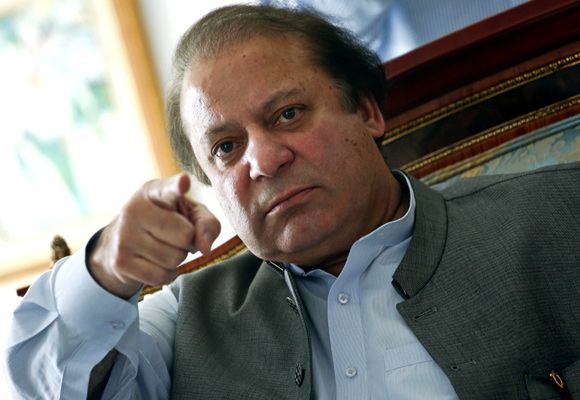 When Pakistan Prime Minister Nawaz Sharif visits the White House on Wednesday, it will be his first encounter with an American president since that turbulent meeting with Bill Clinton when the Kargil war was raging 14 years ago.
When Pakistan Prime Minister Nawaz Sharif visits the White House on Wednesday, it will be his first encounter with an American president since that turbulent meeting with Bill Clinton when the Kargil war was raging 14 years ago.
For a President battered by the United States Congress, the media and his critics in his second term over his relationship with Monica Lewinsky, Bill Clinton still remembers his July 4, 1999 meeting with Pakistan Prime Minister Nawaz Sharif as his 'most ferocious encounter in politics -- bar none.
Through his presidency, Clinton and one of his oldest friends, the historian Taylor Branch, met late at night and discussed the president's experiences to create for 'future historians an unfiltered record of presidential experience.'
Branch and Clinton met whenever the leader of the free world had the time to discuss the president's thoughts and feelings on the business he had conducted that day or week.
The Clinton Tapes, A President's Secret Diary (Simon & Schuster, 2009) is an unusual tapestry of history, granting the reader a rare glimpse of eight years of the Clinton administration.
On Pages 560-561 of the book comes the zinger on Nawaz Sharif, a meeting that ended the Kargil War and saved thousands of lives on the Indian and Pakistani sides.
Clinton told Branch that he had not invited Sharif to Washington. 'Sharif had invited himself to Washington and Clinton had explicitly told him not to come,' Branch writes.
'"Your army is in the wrong here," he told Sharif. Clinton could not mediate the Kashmir crisis without the consent of both warring nations and India adamantly refused,' Branch continues.
'The Indians saw nothing to mediate. They were winning militarily, and Kashmir belonged to India, period.'
After Sharif flew to Washington, ignoring Clinton's advice, the president cancelled some of his July 4 engagements. Remember, Americans like to take the day off and celebrate their Independence Day.
He refused to receive Sharif at the White House, and met the Pakistani prime minister in the library at Blair House, across the street from his home.
'Clinton put his position bluntly,' Branch writes, 'If Sharif withdrew Pakistani troops from Kashmir, the United States would express relief without praise. If Sharif refused to withdraw, the United States would be forced to shift its historic alliance with Pakistan publicly towards India.'
'For hours, said the president, Sharif's delegation invented trick language to suggest that Clinton somehow blessed a Pakistani withdrawal.'
'Or that Pakistan itself need not need to withdraw, because the fighters in Kashmir were really mujahideen fighters disguised as soldiers rather than vice versa,' Branch recalled.
Angered by Sharif's obstinancy, Clinton asked aides on both sides to leave and met with the Pakistani prime minister alone.
He told Sharif forcefully that the Kargil conflict was not a border skirmish, it had the potential to set off a nuclear war. When the Cuban Missile Crisis of 1962 occurred, Clinton said, the US and the Soviet Union had more information about each other's nuclear arsenal than India and Pakistan had in 1999.
Your brinkmanship, Clinton told Sharif, could set off nuclear exchanges.
Sharif was relentless. Surrender for him, he told Clinton, was worse for him than war.
He could either order a nuclear war as a patriot, Branch wrote, or risk being overthrown by Pakistan's army chief, General Pervez Musharraf.
Kargil was Musharraf's handiwork, but the Pakistani people would not tolerate a withdrawal from Kargil.
'Sharif could yield to Clinton only by baring his neck to Musharraf,' Clinton told Branch of their exchange.
So be it, Clinton said. Sharif, as head of the government, would have to withdraw, and cover himself however he could.
Clinton told Branch that 'their argument, which consumed Independence Day, was his most ferocious encounter in politics -- bar none.'
Three months and eight days after his meeting with Clinton -- that resulted in the end of the Kargil War -- Nawaz Sharif was overthrown by General Pervez Musharraf in a coup.
Photograph: Damir Sagolj/Reuters










